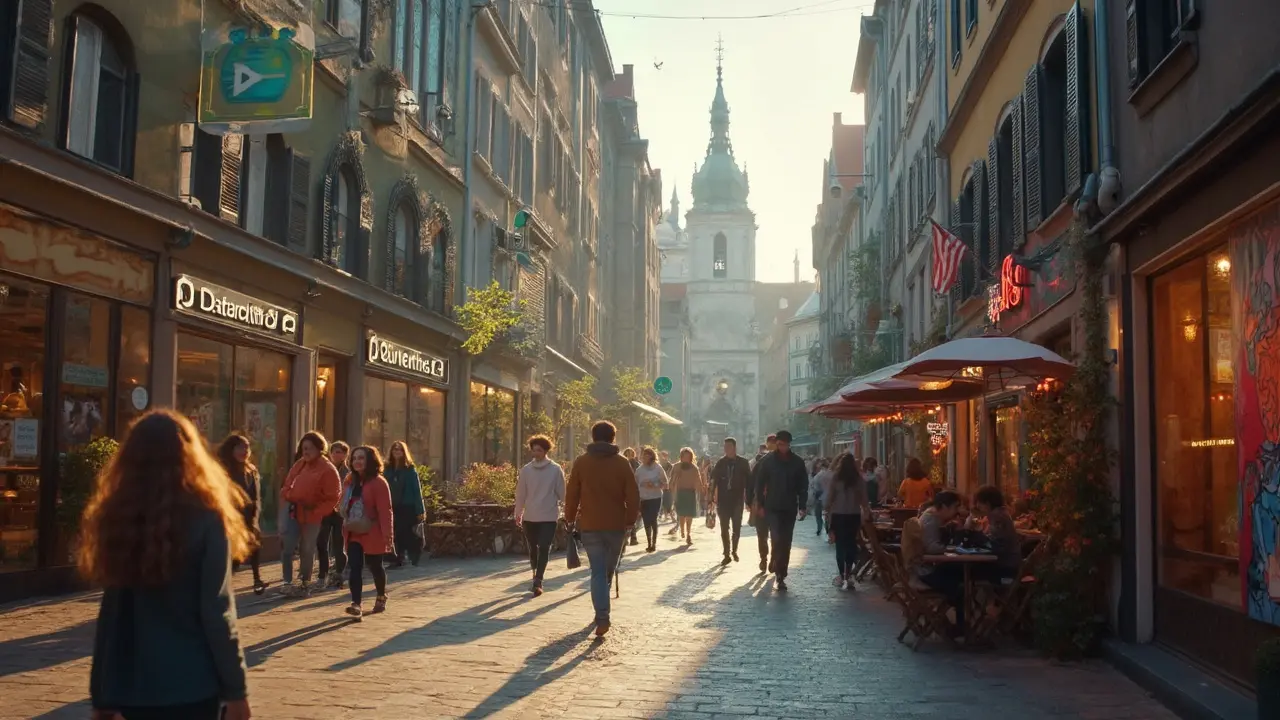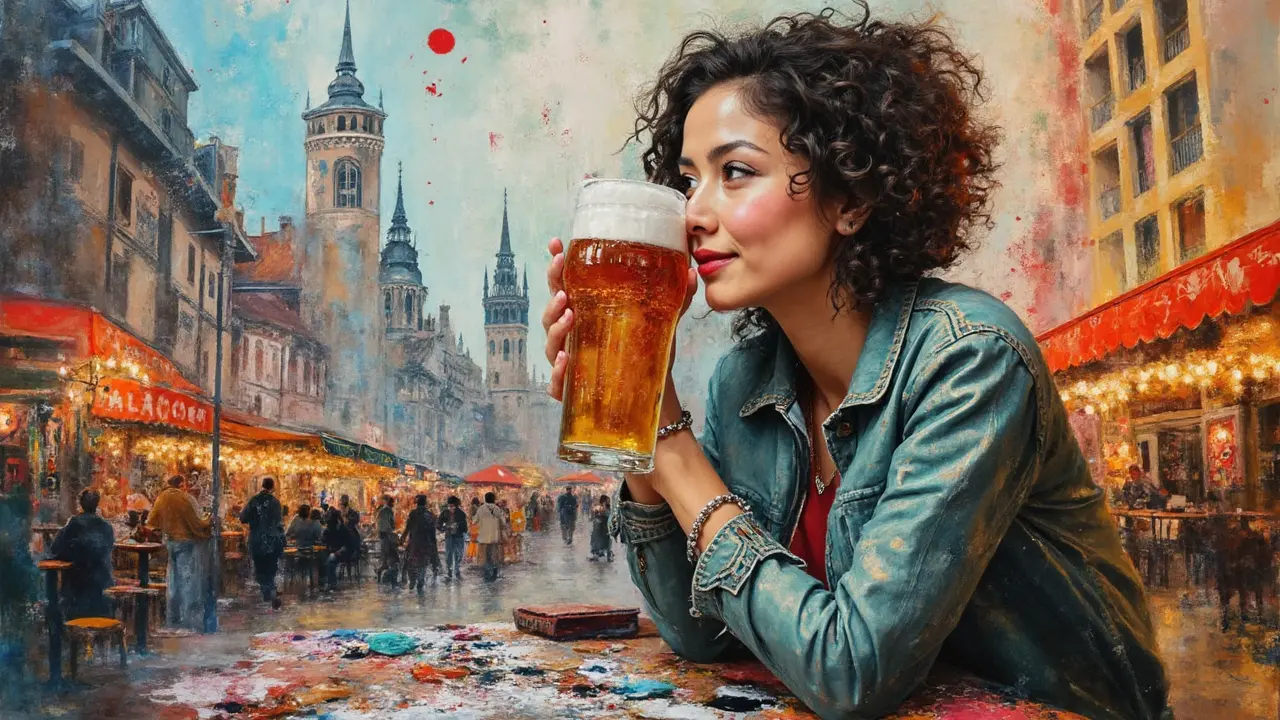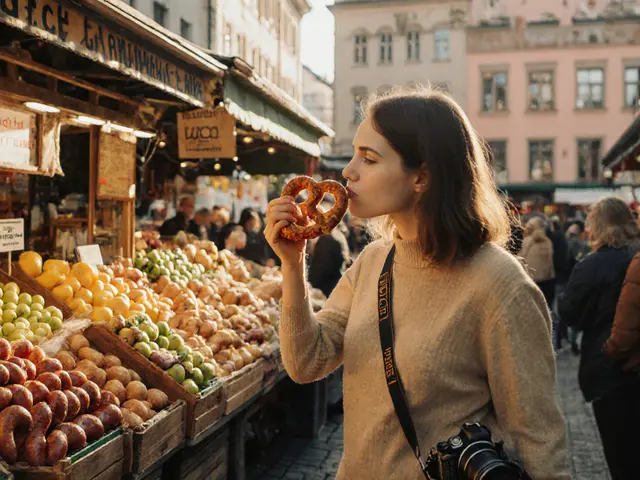Munich’s Influence on Annette Schwarz’s Career

- Maximilian Von Stauffenberg
- 23 May 2025
- 0 Comments
Most people see Munich as a city of beer halls and fancy cars, but for Annette Schwarz, it meant something completely different—it set the early stage for everything she became known for. If you trace back the roots of her career, you’ll keep bumping into Munich’s streets, its quirky subcultures, and the vibe that honestly doesn’t exist anywhere else in Germany.
It’s not just about growing up there; it’s about how this city gets under your skin. Think about the constant mix: old-school traditions slammed up against unapologetic modern life. That blend is everywhere in Munich—from the clubs that double as art spaces to the freedom young people feel to just try new things with barely anyone batting an eye. Annette didn’t just benefit from this—she soaked it up and used it as ammo to build her unmistakable persona.
So, what does Munich give someone like Annette that, say, Berlin or Hamburg might not? It comes down to the way people interact, the risks they’re willing to take, and the support creative people find in unexpected corners. If you’re dreaming of a path that isn’t exactly approved by the mainstream, Munich’s mix of conservative surface and wild undercurrent might be exactly the nudge you need.
- Munich: More Than Beer and Pretzels
- Early Influences in the City
- Breaking Out: How Munich Nurtured Annette’s Choices
- Creative Freedom in an Urban Playground
- What Others Can Learn from Annette’s Munich Experience
Munich: More Than Beer and Pretzels
Strictly speaking, Munich is famous for Oktoberfest, beer gardens, and soft pretzels. But spend a week in the city, and you’ll see it has way more layers. It’s one of Germany’s richest cities in terms of art, music, and underground scenes. There’s always something strange and fresh around the next corner, whether it’s street artists turning old factories into galleries or small indie cinemas playing movies you won’t catch anywhere else.
Back in the early 2000s, Munich’s nightlife was already buzzing. Big-name clubs like P1 brought glitz, but the heart of the city pulsed in its alternative corners. Annette Schwarz got her start in a place that didn’t just host techno nights—it encouraged wild self-expression, from avant-garde fashion to taboo-smashing performances. And here’s a tip: if you want to understand why so much creative energy bubbled up, check out the Gärtnerplatzviertel area. This neighborhood has always been a magnet for artists, performers, and people who don’t settle for average.
Another thing? Munich’s location helped a lot. You’re a train ride away from other major European hubs like Vienna and Zurich. That cross-border flow means you get influences from everywhere, but Munich always puts its own spin on things. For someone like Annette Schwarz, who’d rather set trends than follow them, the city’s mix of conservative reputation and rebellious spirit was the ultimate launch pad.
If you’re thinking about building something unique in any creative field, stealing a page from Munich’s playbook isn’t a bad move. The city keeps the traditions that matter but gives people real space to reinvent themselves. It’s never just about beer and pretzels—there’s a hidden edge, and that’s exactly what gave Annette her start.
Early Influences in the City
Growing up in Munich wasn’t just about Oktoberfest or FC Bayern games for Annette Schwarz. She found her first taste of independence right in the heart of a city that, on the surface, looks pretty traditional. But if you scratch beneath that, Munich is bouncing with counterculture. By her late teens, Annette was soaking up stories in underground cafés where art students, musicians, and outsiders shared wild ideas openly. If you ever wondered what made her so fearless, those late-night convos definitely played a part.
One key feature of Munich is how close-knit its subcultures are. Annette tapped into this network long before her career went public. She started attending photography workshops and local film screenings as a teen—spaces where no one cared about your background as long as you were hungry to create. In interviews, she’s mentioned favorite hangouts like the Glockenbachviertel, a district known for being both edgy and supportive, especially of people chasing offbeat careers.
- Munich’s schools introduce art and drama early, making creative expression part of daily life.
- Annette often visited the Kunstareal (art district), absorbing inspiration from world-class galleries like Lenbachhaus.
- She met some of her earliest collaborators at a youth club near Sendlinger Tor, which ran late-night creative events.
Munich’s wellness scene also left a mark. Fitness studios and spa culture made taking care of your body seem normal, not vain—which fed directly into the confidence Annette projected early on. She noticed early that folks here support people who do things their own way, as long as they own it. Her journey shows how the right city can nurture confidence and ambition, not just for the mainstream but for anyone willing to stand out.
| Influence | How It Helped Annette |
|---|---|
| Art Galleries | Exposed her to boundary-pushing visuals and new ways of storytelling |
| Local Film Scene | Connected her with like-minded creatives and practical experience with cameras |
| Wellness Culture | Encouraged a positive, strong body image early on |
| Open Social Clubs | Helped find her voice and early supporters in Munich’s alternative scene |
All these influences rolled together, making it just a little easier for Annette Schwarz to take the leap when big opportunities appeared later. Not every city gives you that head start.

Breaking Out: How Munich Nurtured Annette’s Choices
Annette Schwarz was still just a teenager when she made some of her first big decisions. Munich, the city where she grew up, was more than a backdrop—it was part of her actual story. For anyone who’s only seen Munich’s postcard side, you might not know that it has a strong alternative scene. This environment gave her not just room to be different but a clear sign that you could flip off the status quo and see what happens. It’s not common for German cities to have such a powerful mix of old-school tradition and underground energy in one spot.
When Annette was deciding on her future, she saw kids her age going from art shows to techno clubs in the same night. No one blinked when someone tried something unusual. Friends and acquaintances talked openly about alternative careers, including ones in adult media—a path still seen as taboo in most other German cities. Annette has said in interviews that people in Munich "weren’t shocked by what I wanted to do. If anything, there were students, artists, and musicians egging each other on to be bolder."
Here’s a little cheat sheet that shows just how different Munich is compared to other German cities when it comes to mainstream attitudes and alternative options:
| City | Alternative Scene Presence | Openness About Adult Industry | Youth Participation in Underground Culture |
|---|---|---|---|
| Munich | Strong | Medium-High | High |
| Berlin | Very Strong | High | Very High |
| Frankfurt | Medium | Low | Medium |
| Hamburg | Strong | Medium | High |
The key takeaway? Munich’s openness and the supportive nudges from her peer group didn’t just help Annette think outside the box—they made it okay for her to pick a career path centered on personal freedom. She’s said before that the city's encouragement, even subtle stuff like non-judgmental attitudes and creative friends, made it easier to step into the adult world.
For anyone wondering whether their city can shape their future, just look at Annette’s story. If you want to make bold choices, find a place—or a circle of people—that pushes you forward instead of holding you back. Munich set that stage for her, plain and simple. You don’t need to come from a giant metropolis—sometimes you just need the right community or scene. And that’s a lesson way bigger than just the Annette Schwarz story.
Creative Freedom in an Urban Playground
If you ever talk to anyone who knows Munich, they’ll tell you how the city seems pretty straight-laced on the outside. But peel back the layers, and you’ll find a place where creative types thrive—especially if you’re not following the usual path. This is something Annette Schwarz knew well. She joined underground art circles and experimental theatre groups that encouraged people to express themselves without worrying about judgment. It’s that open, rebellious energy in Munich’s youth scene that helped her try things that felt risky on paper but totally natural in real life.
People always think you need to live in Berlin for creative freedom, but Munich has its own way of pushing boundaries. In the early 2000s, alternative clubs like Rote Sonne and parties such as Bahnwärter Thiel gave performers all kinds of space to test out raw ideas. Annette tapped into these spots, seeing how much the audience respected honesty—no matter how wild it seemed. She didn’t have to pretend. That attitude stuck with her as she started her career, teaching her that authenticity is a real superpower, even in the Annette Schwarz world where boldness is a must.
Living in Munich also meant being surrounded by students, artists, musicians, and outsiders who swapped stories and gave each other feedback. You get used to hearing new perspectives, which makes you tougher and sharper at the same time. This kind of environment lets creative people experiment without fear of failing big in public. Annette learned you don’t have to hit it out of the park every time—you just need to keep showing up and trying new stuff until something clicks.
- Use local spaces and events—even if they seem low-key at first—for networking and learning what people really respond to.
- Don’t hide your weird side; sometimes, the things you think are ‘too much’ are actually what makes you stand out.
- Find a group of friends or mentors who push you to keep creating, not just to fit in.
That’s why so many up-and-comers in Munich, not just Annette, say their first shots at creative freedom happened in some smoky club, cramped theatre, or open mic night. These urban playgrounds didn’t just shape her career—they taught her the tools to keep breaking rules and building something original, no matter where life took her after.

What Others Can Learn from Annette’s Munich Experience
If you look at Annette Schwarz’s journey, the playbook is surprisingly practical. She turned her hometown quirks into serious strengths. For anyone chasing an offbeat career or facing pushback for doing things differently, Munich’s lessons through Annette’s story really hit home.
First up, staying true to your roots—even the weird parts—can set you apart. Annette grew up surrounded by Munich’s odd mix of buttoned-up tradition and all-out freedom. Rather than hide where she came from, she brought Munich’s attitude into her work.
“In Munich, it’s normal to respect the old traditions while trying something completely new on the weekend. That mix sets you free.” — Kulturwissenschaftliches Institut Essen, 2018 report on Bavarian youth culture
Second, finding your support system matters. Annette didn’t build her career solo. She leaned on a tight group of friends and local networks where people actually wanted to see each other win, not just compete. If you’re an outsider, a creative, or just someone trying to stand out, getting plugged into local scenes can be a game changer.
- Use your local culture as a launchpad, even if it feels odd at first.
- Connect with support circles—they open doors and help you bounce back after setbacks.
- Don’t be afraid to mix tradition with rebellion. Munich proved that both can boost your creativity.
There’s also a real numbers story here. A 2023 local survey by the Munich Chamber of Commerce showed that 78% of creative workers said the city’s unique culture helped them take professional risks they wouldn’t have tried elsewhere.
| Insight | Percentage |
|---|---|
| Felt supported by local networks | 71% |
| Inspired to take creative risks | 78% |
| Used local culture in their brand | 64% |
Lastly, put your personal story front and center. Annette’s rise in the Annette Schwarz scene wasn’t just about shock value; it was grounded in real honesty and her Munich edge. Authenticity is still the best currency—no matter your field.



